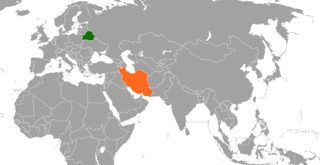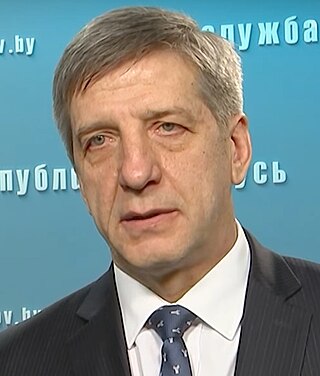
Belarus, officially the Republic of Belarus, is a landlocked country in Eastern Europe. It is bordered by Russia to the east and northeast, Ukraine to the south, Poland to the west, and Lithuania and Latvia to the northwest. Covering an area of 207,600 square kilometres (80,200 sq mi) and with a population of 9.2 million, Belarus is the 13th-largest and the 20th-most populous country in Europe. The country has a hemiboreal climate and is administratively divided into seven regions. Minsk is the capital and largest city.

The politics of Belarus takes place in a framework of a presidential republic with a bicameral parliament. The President of Belarus is the head of state. Executive power is nominally exercised by the government, at its top sits a ceremonial prime minister, appointed directly by the President. Legislative power is de jure vested in the bicameral parliament, the National Assembly, however the president may enact decrees that are executed the same way as laws, for undisputed time.

Alexander Grigoryevich Lukashenko is a Belarusian politician who has been the president of Belarus since the establishment of the office on 20 July 1994, making him the longest-sitting European president.

The "State Anthem of the Republic of Belarus", better known as "My Belarusy", is the national anthem of Belarus. It was originally written in the 1940s and adopted in 1955 for use in the Byelorussian Soviet Socialist Republic. The music of the Byelorussian SSR's regional anthem was composed by Niescier Sakałoŭski and the lyrics were written by Michas Klimkovič. After the dissolution of the Soviet Union, the music composed by Sakalowski was kept and the lyrics were discarded. New lyrics, which were written by Klimkovič and Uladzimir Karyzna, were adopted by a presidential decree issued on 2 July 2002.

The national flag of Belarus is a red-and-green flag with a white-and-red ornament pattern placed at the hoist (staff) end. The current design was introduced in 2012 by the State Committee for Standardisation of the Republic of Belarus, and is adapted from a design approved in a May 1995 referendum. It is a modification of the 1951 flag used while the country was a republic of the Soviet Union. Changes made to the Soviet-era flag were the removal of communist symbols – the hammer and sickle and the red star – as well as the reversal of the colours in the ornament pattern. Since the 1995 referendum, several flags used by Belarusian government officials and agencies have been modelled on this national flag.

The national emblem of Belarus features a ribbon in the colors of the national flag, a silhouette of Belarus, wheat ears and a red star. It is sometimes referred to as the coat of arms of Belarus, although in heraldic terms this is inaccurate as the emblem does not respect the rules of conventional heraldry. The emblem is an allusion to one that was used by the Byelorussian SSR, designed by Ivan Dubasov in 1950, with the biggest change being a replacement of the Communist hammer and sickle with a silhouette of Belarus. The Belarusian name is Dziaržaŭny herb Respubliki Biełaruś, and the name in Russian is Gosudarstvennyĭ gerb Respubliki Belarusʹ.

Belarus competed at the 2004 Summer Olympics in Athens, Greece, from 13 to 29 August 2004. This was the nation's fifth appearance at the Summer Olympics in the post-Soviet era. The Belarus Olympic Committee sent a total of 151 athletes to the Games, 82 men and 69 women, to compete in 22 sports.

Belarus elects on national level a head of state—the president—and a legislature. The president is elected for a five-year term by the people. The National Assembly has two chambers. The House of Representatives has 110 members elected in single-seat constituencies elected for a four-year term. The Council of the Republic has 64 members, 56 members indirectly elected and eight members appointed by the president.

Athletes from Belarus began their Olympic participation at the 1952 Summer Games in Helsinki, Finland, as part of the Soviet Union. After the Soviet Union disbanded in 1991, Belarus, along with four of the other fourteen former Soviet republics, competed in the 1992 Winter Olympics as the Unified Team. Later in 1992, Belarus joined eleven republics to compete as the Unified Team at the Summer Games in Barcelona, Spain. Two years later, Belarus competed for the first time as an independent nation in the 1994 Winter Olympics, held in Lillehammer, Norway.

The Constitution of the Republic of Belarus is the ultimate law of Belarus. The Constitution is composed of a preamble and nine sections divided into 146 articles.

Capital punishment is a legal penalty in Belarus. At least four executions were carried out in the country in 2018.

The president of the Republic of Belarus is the head of state and head of government of Belarus. The office was created in 1994 with the passing of the Constitution of Belarus by the Supreme Soviet. This replaced the office of Chairman of the Supreme Soviet as the head of state. The tasks of the president include executing foreign and domestic policy, defending the rights and general welfare of citizens and residents, and upholding the Constitution. The president is mandated by the Constitution to serve as a leader in the social affairs of the country and to act as its main representative abroad. The duties, responsibilities and other transitional clauses dealing with the presidency are listed in Chapter Three, Articles 79 through 89, of the Constitution.

The Belarusian Association of Journalists (BAJ) is a Belarusian professional association of journalists from independent media, created in 1995 to protect freedom of speech, freedom of information, promote the professional standards of journalism, conduct monitoring of Belarusian press, and offer legal support to all media workers.

The Council of the Republic of the National Assembly of the Republic of Belarus is the upper house of the parliament of Belarus.

A four-question referendum was held in Belarus on 14 May 1995, alongside parliamentary elections. The four issues were the possibility of giving the Russian language equal status with Belarusian, whether new national symbols should be adopted, whether there should be economic integration with Russia and changes to the constitution that would allow early elections if Parliament systematically violated the constitution. According to official results, all four were approved by at least three-quarters of voters, with a turnout of 64.8%.
Upon the independence of Belarus from the Soviet Union, the country resurrected national symbols that were used before the Soviet era. These included a flag of red and white stripes and a coat of arms consisting of a charging knight on horseback. These national symbols were replaced by Soviet-era symbols in a disputed 1995 vote. Those two symbols, along with the national anthem, are the constitutionally defined national symbols of Belarus.

Belarus–Iran relations are foreign relations between Belarus and Iran. The Byelorussian Soviet Socialist Republic recognized de facto the Islamic Republic of Iran in February 1979 and both countries established de jure diplomatic relations in 1992. Belarus has an embassy in Tehran. Iran has an embassy in Minsk.

The Central Election Commission of the Republic of Belarus is the body responsible for conducting national elections and overseeing local elections in Belarus. The CEC of Belarus is a member of the Association of Central and Eastern European Election Officials.

The 2022 Belarusian constitutional referendum was held in Belarus on 27 February 2022.

Vladzimir Arkadyevich Astapenka is a Belarusian diplomat who was ambassador to Cuba, Argentina, Chile, Paraguay and Peru in the 2010s. Astapenka resigned in September 2020 in alignment with the 2020–2021 Belarusian protests that followed the 2020 Belarusian presidential election He was nominated to several positions in the Belarusian opposition, including Deputy Representative for Foreign Affairs of the Belarusian United Transitional Cabinet. and head of the Mission for Democratic Belarus in Brussels in October 2022.











